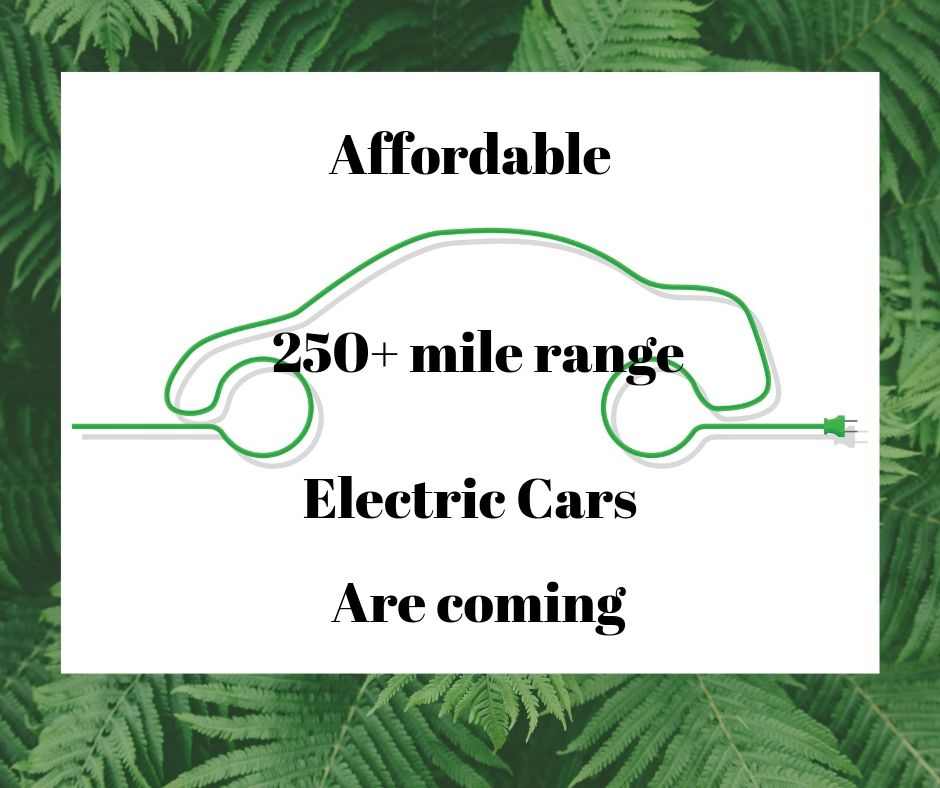Last Update: August 21, 2019

First things first is to acknowledge that the EV market is starting to see an influx of long range electric cars. Some of them are even affordable. The following list is surely incomplete, and uses information gathered (August 2019) from the EPA's FuelEconomy web site. The MSRP's were collected from manufacturers websites, and I cannot guarantee that all these are non-incentivized prices. About 2/3rds of these are what we'd call affordable cars. But, most of the affordable cars on this list don't meet the 250 miles range criteria in the question.
| Car | Range | MSRP |
|---|---|---|
| 2019 Nissan Leaf (62 kWh) | 226 miles | $37,445 |
| 2020 Jaguar I Pace | 234 miles | $69,500 |
| 2019 Chevy Bolt EV | 238 miles | $36,200 |
| 2019 Kia Niro EV | 239 miles | $38,500 |
| 2019 Tesla Model 3 SR Plus | 240 miles | $38,990 |
| 2020 Kia Soul EV | 243 miles | ?? |
| 2019 Hyundai Kona EV | 258 miles | $36,950 |
| 2020 Chevy Bolt EV | 259 miles | ?? |
| 2019 Tesla Model 3 LR | 310 miles | $47,990 |
| 2019 Tesla Model S LR | 370 miles | $79,990 |
Two manufacturers (Hyundai, Chevy) have, or have announced, 250 mile range affordable electric cars. Three others (Nissan, Kia, Tesla) have affordable electric cars that are close to the 250 mile threshold.
Therefore let me suggest that a transition is underway. Something shifted in electric car manufacturing enabling the manufacturers to drop the price for 200+ miles of range.
Previous to 2018 this much electric range meant buying a Tesla for a large price. Now you can go to a Hyundai dealership and buy it, and soon at a GM dealership, and the other automakers are surely readying their examples.
We know that what happened in Tesla's case is that Tesla built Gigafactory 1. The primary benefit of the Gigafactory was to decrease battery pack cost by hugely increasing manufacturing scale. Tesla has made it clear the Gigafactory enabled a much lower cost per kiloWatt-hour of battery pack, allowing Tesla to offer cars at a much lower price.
Since none of these car companies are altruistic enough to sell cars at a loss, we know that GM and Hyundai and the others also had to have made a similar battery pack price breakthrough.
It's long been promised that higher sales and manufacturing levels would allow automakers to implement manufacturing cost savings. With a lower manufacturing cost, they could lower the vehicle cost and still make a profit.
Bottom line is that lowering the cost for electric cars requires a couple sorts of breakthrough:
- Battery technology breakthrough allowing intrinsically lower priced batteries.
- Manufacturing scale allowing lower cost to manufacture electric cars.
All along we've been told the battery packs are the biggest cost driver in electric cars. Lower battery pack prices, and you can lower electric car prices. It wasn't that long ago that a 300 mile range electric car meant a Tesla Model S at $80,000, but now that price buys you a 370 mile range and the 300 mile range is about $50,000.
In other words the manufacturers are heading in the right direction.


